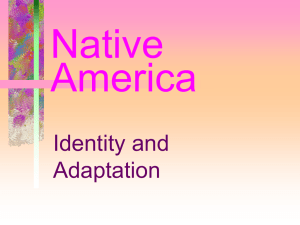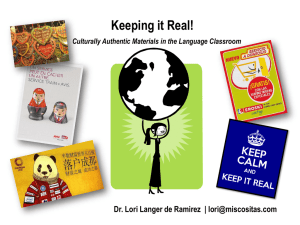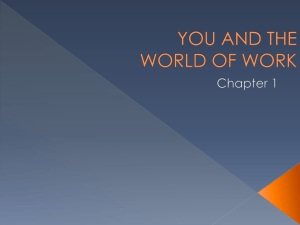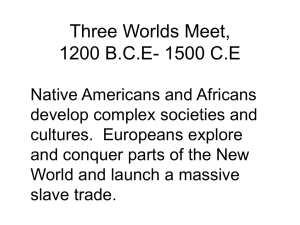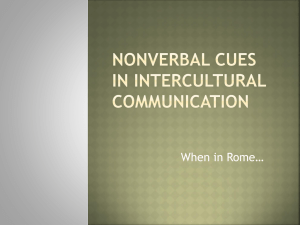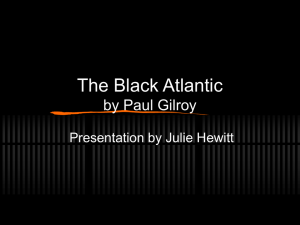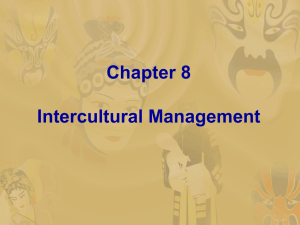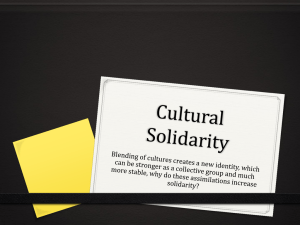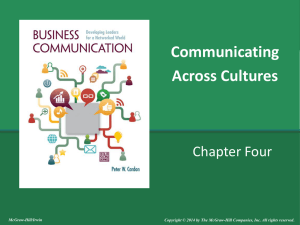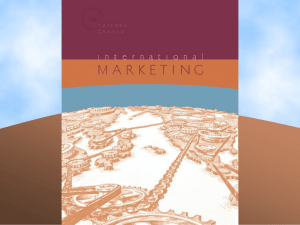Mankind and its different cultures
advertisement
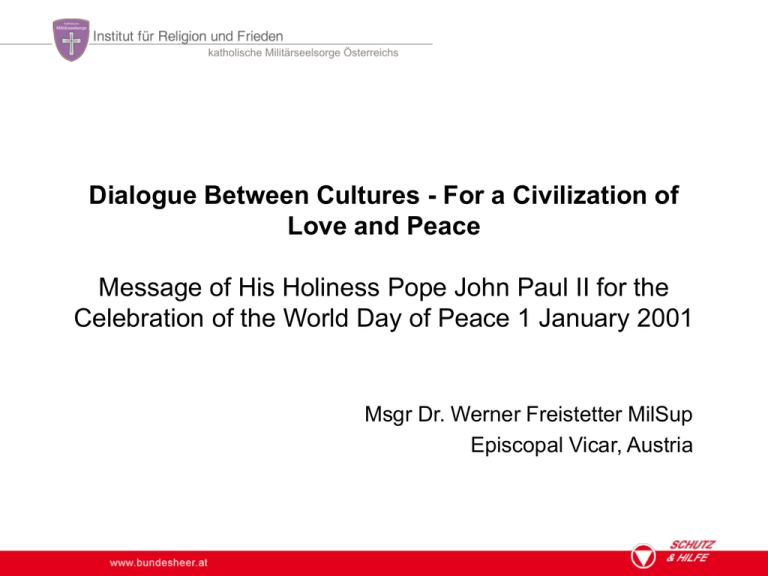
Dialogue Between Cultures - For a Civilization of Love and Peace Message of His Holiness Pope John Paul II for the Celebration of the World Day of Peace 1 January 2001 Msgr Dr. Werner Freistetter MilSup Episcopal Vicar, Austria www.bundesheer.at Hope and vision: universal brotherhood ”At the dawn of a new millennium, there is growing hope that relationships between people will be increasingly inspired by the ideal of a truly universal brotherhood. Unless this ideal is shared, there will be no way to ensure a stable peace.” (1) www.bundesheer.at Hope and vision: universal brotherhood ”becoming more deeply rooted in people's minds” (1) Human rights UN globalization leading to a ”progressive unification of the economy, culture and society” (1) Foto: Bundesheer www.bundesheer.at Hope and vision: universal brotherhood Challenges Bloody conflicts Ancient hatreds Endangered solidarity between people of different cultures Migration problems www.bundesheer.at ”Mankind and its different cultures” Complexity and diversity Specific historical evolution ”Culture is the form of man‘s self-expression in his journey through history” (individual + social) (4) www.bundesheer.at ”Mankind and its different cultures” Why cultures? Intellect and will drive human beings to ”‘cultivate natural goods and values‘” (8) incorporate their knowledge of all aspects of life in a higher cultural synthesis, esp. as concerns: social + political life economy security existential values (esp. religious) www.bundesheer.at ”Mankind and its different cultures” Enduring + contingent elements Cultures are unique, original, form an organic whole www.bundesheer.at ”Mankind and its different cultures” ”a person necessarily lives within a specific culture” (5) Individuals are influenced by + influence their culture. www.bundesheer.at ”Human development and being part of a culture” ”need to accept one‘s own culture as a structuring element of one‘s personality” (6) – Need ”a firm rooting in a specific ‘soil‘” (6) for a balanced development – Even Jesus ”the Nazarean” (6) – Love of one‘s own country = a positive value Die hl. Familie Kärntner Wappen www.bundesheer.at ”Human development and being part of a culture” BUT: Every specific culture necessarily has its limitations! Appreciate the values of one‘s own culture But also: know the limitations study other cultures without prejudice broader (Christian) horizon: unity of the human race www.bundesheer.at ”Cultural differences and mutual respect” Cultural differences often cause problems: – source of misunderstanding – cause of conflicts and wars – ”aggressive claims of some cultures against others” (8) – difficult situation of ethnic and cultural minorities Foto: Bundesheer www.bundesheer.at ”Cultural differences and mutual respect” Reason for these problems: – ”‚Mystery of evil‘ at work in human history” (8) • In people and their cultures • Need of purification and salvation – Criteria: ”commitment to the human cause” (8) www.bundesheer.at ”capacity to promote human dignity” (8) ”Cultural differences and mutual respect” Two dangers „slavish conformity“ to Western cultural models (9) ”Radicalization of identity” (9) (secularism, practical atheism, individualism) www.bundesheer.at ”Dialogue between cultures” Cultures ”have to be perfected through dialogue and communion” (10) – Basis: unity of the human family – ”dialogue between cultures […] emerges as an intrinsic demand of human nature itself, as well as of culture” (10) – ”Dialogue leads to a recognition of diversity” (10) – ”a privileged means for building the civilization of love and peace” (10) – not uniformity, but multiform variety www.bundesheer.at ”Possibilities and risks of global communication” Possibilities Risks Accurate and up-to-date information available for anyone (in principle!) Few countries have monopoly on cultural industries New cultural models, new understanding of the world Export of implicit valuesystem Hitherto unthinkable possibilities Undermining cultural distinctness, loss of cultural identity www.bundesheer.at ”The challenge of migration” Important social phenomenon of our time Challenges: welcome and integration Usually: cultural enrichment for all In some countries: Remain culturally separated, but live together in peace In some countries: unresolved problems, tensions and conflicts Foto: Bundesheer www.bundesheer.at ”The challenge of migration” Ethical principles Treat immigrants with ”the respect due to the dignity of every human person“ Enable dignified and peaceful life for immigrants and local inhabitants Respect and accept the cultural practices of the immigrants (as long as they do not contravene natural law/ fundamental human rights) If they are not compatible with the practices of the majority: ”realistic evaluation of the common good” in a spirit of openness (14) www.bundesheer.at ”Respect for the cultures and the ‚cultural profile‘ of different regions” ”cultural equilibrium” for each region – Ensure a cultural profile of the region = basic heritage of languages, traditions and values that are part of the national identity – Because it is important for growth/education – Of course at the same time: welcoming minorities and respecting their basic rights – Cannot be ensured by legislative measures alone, the values must be in peoples‘ hearts. www.bundesheer.at ”Recognition of shared values” = ”values which are common to all cultures because they are rooted in the nature of the person” (16) Solidarity Life Peace Education www.bundesheer.at ”Forgiveness and reconciliation” Great Jubilee 2000: challenging call to reconciliation Utopian and naive? – But: only path to peace (from the Christian point of view) ”Father, forgive them, for they know not what they do” (Lk 23:34) www.bundesheer.at ”Forgiveness and reconciliation” ”In that day there will be a highway from Egypt to Assyria, and the Assyrian will come into Egypt, and the Egyptian into Assyria, and the Egyptians will worship with the Assyrians. In that day Israel will be the third with Egypt and Assyria, a blessing in the midst of the earth, whom the Lord of hosts has blessed, saying, ‘Blessed be Egypt my people, and Assyria the work of my hands, and Israel my heritage'” (Is 19:23-25) PMI Lourdes www.bundesheer.at ”An appeal to young people” To ”young people of the whole world, who are humanity‘s future and living stones in the building of the civilization of love” Contemplate ”the miracle of the universality of the church” ”diversity in the unity of the same faith, the same hope, the same love” ”The Gospel calls you to rebuild the original unity of the human family” ”becoming men and women capable of solidarity, peace and love of life, with respect for everyone” (22) www.bundesheer.at


